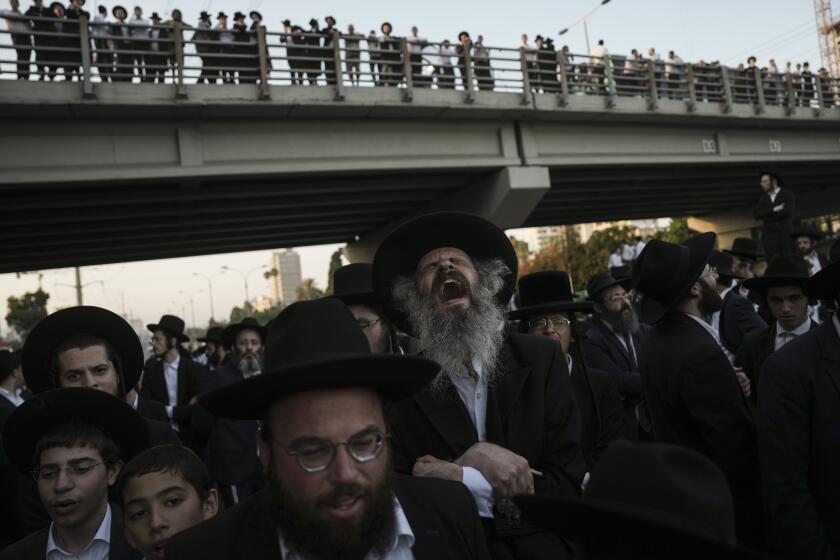In Sri Lanka, feuding persists after presidential vote
Any hope that the rancor and animosity marking Sri Lanka’s seven-week election campaign might end with the final vote count was short-lived Wednesday amid charges, countercharges, threatened lawsuits and fear that the rivals’ differences could turn violent, spilling onto the street.
The clash of strong men saw President Mahinda Rajapaksa reelected with 57.9% of the vote against his former army chief Sarath Fonseka’s 40.6%, state news media reported. The results were greeted with fireworks and celebrations in the winning camp.
In a letter to the Sri Lankan electoral commission and in a follow-up news conference, Fonseka said he would not accept the results and threatened to file a lawsuit to have the election overturned, citing voting irregularities.
The two men dominated a hard-fought campaign that included 20 other candidates. Monitoring groups said the election season was marred by at least two bombings, four killings, 12 shootings and 137 people injured.
Fonseka also claimed in a YouTube video, on his Facebook page and in comments to reporters that he was the object of an assassination attempt. He said the president used the state media to attack him, misappropriated public funds and employed government forces to hold him hostage in a luxury hotel.
The government, which had tried to disqualify the general’s candidacy Tuesday even as voters went to the polls, denied that it was restricting Fonseka’s movements and said the army presence outside the Cinnamon Lakeside hotel in Colombo, the capital, was a security precaution.
“As long as he’s there, we need to ensure his safety,” military spokesman Brig. Udaya Nanayakkara said. “Otherwise, if anything happened, the blame comes to the government and security forces.”
Nine army deserters found among Fonseka’s supporters were subsequently detained and two weapons were seized, Nanayakkara added.
During the campaign, the government characterized Fonseka as a dictator-in-waiting who planned to rally his former subordinates and launch a coup. The army spokesman denied that this was part of the motivation for the security cordon.
Sri Lanka has many deep-seated problems in need of attention after decades of war against minority Tamil separatists, including resettlement of the estimated 100,000 Tamils still in internment camps, political and legal reform, economic development, and ethnic and political reconciliation.
Until the current standoff is resolved, analysts said, it will be difficult to move forward.
“The election was very hard fought and there are a lot of questions with the process,” said Paikiasothy Saravanamuttu, executive director of the Center for Policy Alternatives, an independent think tank. “The first thing will have to be to ensure there’s no postelection violence.”
Both men are considered heroes among the majority Sinhalese for their role in ending a brutal 26-year civil war. The army in May defeated the Liberation Tigers of Tamil Eelam, which had sought a homeland for marginalized Tamils.
This was also the first time in a generation that many in the Tamil-dominated north voted, given fighting and the rebels’ control of the area. But with voter turnout at about 25% in the northern city of Jaffna, compared with about 74% nationally, many in the region either lacked proper ID, were prevented from voting or opted not to exercise their democratic right.
The president’s support came primarily from Sinhalese, who account for about three-quarters of the population. Many of them appreciated his ending a war that had dragged on for a generation.
“To me, he’s like a god, like a king,” said Sapath Nerangan, 44, a fishmonger. “We were living in fear. Now we’re not afraid to go anywhere.”
Those who supported Fonseka said the appeal included his pledges to help the economy and stem corruption. Thanuga Dimal, 30, a shop owner, said he was impressed by Fonseka’s pledge to reduce the number of ministers -- at 109, it’s among the highest in the world -- with their privileges.
The concern now is that the acrimony so far largely limited to verbal charges and threatened legal challenges could spill onto the streets, and more violence is one thing Sri Lanka doesn’t need.
“This election has revealed a deep polarization in society,” said Jehan Perera, a political analyst. “If the opposition takes up the general’s calls of irregularities, there could be a reaction in wider society. The immediate crisis is about accepting the verdict, and that needs to be overcome.
“It’s going to be a long haul.”
Herath is a special correspondent
More to Read
Sign up for Essential California
The most important California stories and recommendations in your inbox every morning.
You may occasionally receive promotional content from the Los Angeles Times.










